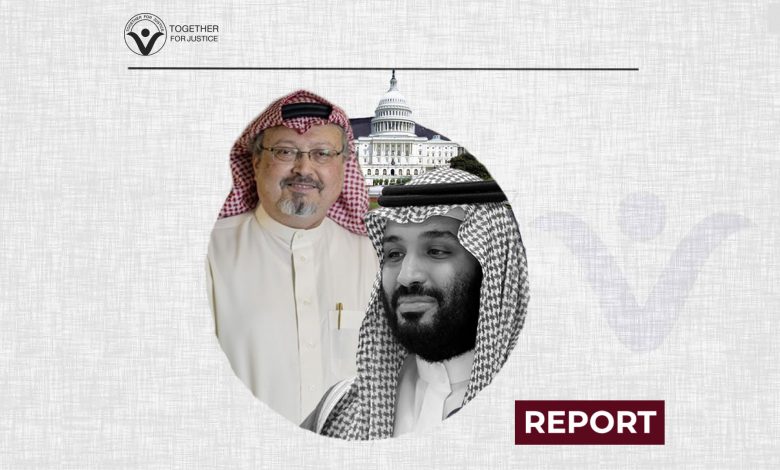Trump Rewards Repression: Unconditional F-35 Deal with MBS Ignores Khashoggi, Silences Human Rights, and Shields a Dictatorship

President Donald Trump’s meeting with Saudi Crown Prince Mohammed bin Salman, followed by his announcement of an unconditional intention to sell F-35 fighter jets to the Saudi regime, represents one of the clearest examples yet of Washington’s willingness to reward authoritarianism while sidelining every principle it claims to uphold. The visit itself was not a diplomatic formality but a political endorsement granted to a ruler directly implicated in brutal repression at home and in the murder of journalist Jamal Khashoggi—an atrocity that U.S. intelligence publicly attributed to the crown prince. Yet instead of demanding accountability, Trump offered the most advanced U.S. weapons systems with no strings attached, sending an unmistakable message that the priorities of his administration rest firmly with arms deals, corporate profit and geopolitical bargaining, rather than human rights, justice or press freedom.
Throughout the meeting, Trump repeatedly deflected questions related to Khashoggi’s murder, dismissing one of the most shocking political assassinations of the decade with the phrase “things happen.” This rhetoric was not accidental; it signaled that the United States is prepared to normalize the erasure of Khashoggi’s killing as a necessary price for maintaining a strategic partnership with Riyadh. The president’s public defense of the crown prince—coupled with attacks on journalists questioning him—exposed a troubling willingness to shield repressive regimes from scrutiny and to treat independent journalism as an obstacle rather than a democratic safeguard. When ABC’s correspondent attempted to confront MBS with the U.S. intelligence assessment, Trump interrupted the question, labeled the network “fake news,” and even suggested that its broadcasting license be reconsidered, underscoring how the event blurred the line between foreign policy advocacy and an open attack on press freedom.
The F-35 deal itself, announced without conditions or human rights benchmarks, deepens longstanding concerns about U.S. complicity in Saudi abuses. For years, American weapons have been used in Yemen in airstrikes that devastated civilian infrastructure, killed thousands of noncombatants and contributed to one of the world’s worst humanitarian crises. Human rights advocates warn that granting Riyadh access to even more sophisticated and lethal aircraft—particularly in the absence of accountability mechanisms—risks further destabilizing the region while empowering a government known for arbitrary detentions, forced disappearances, mass executions and the criminalization of peaceful expression. Even within the United States, lawmakers such as Rep. Ilhan Omar condemned the deal as a reckless and morally bankrupt decision, arguing that the administration is actively rewarding a regime that continues to imprison dissidents, silence critics and weaponize its security apparatus against its own population.
Trump’s decision to designate Saudi Arabia as a “major non-NATO ally,” placing it in the same privileged security category as Israel, adds another layer of concern. The classification expands U.S.–Saudi military cooperation and grants the Saudi regime preferential access to advanced weaponry—despite its record of suppressing fundamental freedoms and obstructing any form of political participation. Human rights groups, including DAWN (founded by Khashoggi), have warned that this expanded partnership consolidates U.S. protection over an authoritarian system and enhances the crown prince’s ability to act without consequences. They argue that the beneficiaries will be American defense contractors, private financial interests and the political elite—not the American public, which will ultimately bear the costs of deepening military entanglement with a government notorious for its abuses.
Trump’s handling of the press during the meeting further underscored the administration’s disregard for transparency and accountability. His attacks on ABC’s reporter, his attempts to silence questions about Epstein and MBS, and his threat to revoke a broadcasting license all reflected a confrontational attitude towards the media and a disturbing readiness to shield authoritarian leaders from criticism. This behavior aligns with a broader pattern in which the administration prioritizes personal relationships, business connections and the interests of political allies over democratic norms or constitutional safeguards. The reference to billions of dollars flowing between the Trump family’s network and Saudi investments—including the $2 billion channeled to Jared Kushner’s private equity firm—raises serious questions about conflicts of interest and whether U.S. foreign policy is being shaped by private financial incentives rather than national or humanitarian considerations.
As the proposed F-35 transfer heads toward potential congressional review, the stakes could not be higher. Congress holds the constitutional authority to block the sale, impose conditions or require a full debate before any military commitments are made. Progressive lawmakers have vowed to resist the deal, emphasizing that American soldiers must not be drawn into future conflicts on behalf of the Saudi regime and that no advanced weaponry should be delivered to a government responsible for war crimes and political repression. The coming legislative battle will test the integrity of U.S. oversight mechanisms and will reveal whether the United States is willing to prioritize human rights and accountability, or whether it will continue down a path of unrestrained militarization and political accommodation with authoritarian partners.
For Together for Justice, the implications are clear. This deal strengthens an authoritarian regime that continues to jail peaceful activists, execute opponents after unfair trials and crush dissent across society. It erases the murder of Jamal Khashoggi, undermines global press freedom and grants enormous military power to a government that has repeatedly violated international law. It also reflects the dangerous convergence of private financial gain, political expediency and foreign policy decisions made without moral or democratic constraint. As Washington prepares to deepen its military partnership with one of the region’s most repressive governments, Together for Justice stresses that human rights must not be sidelined in favor of weapons contracts and geopolitical calculations. The United States cannot credibly claim to champion justice or democratic values while empowering those who violate them with impunity.




